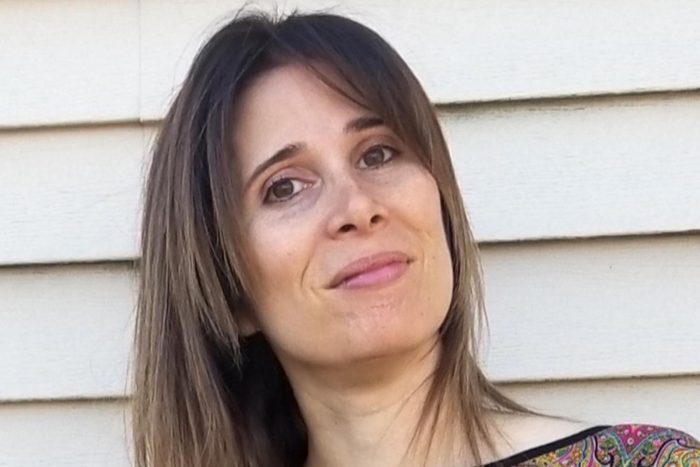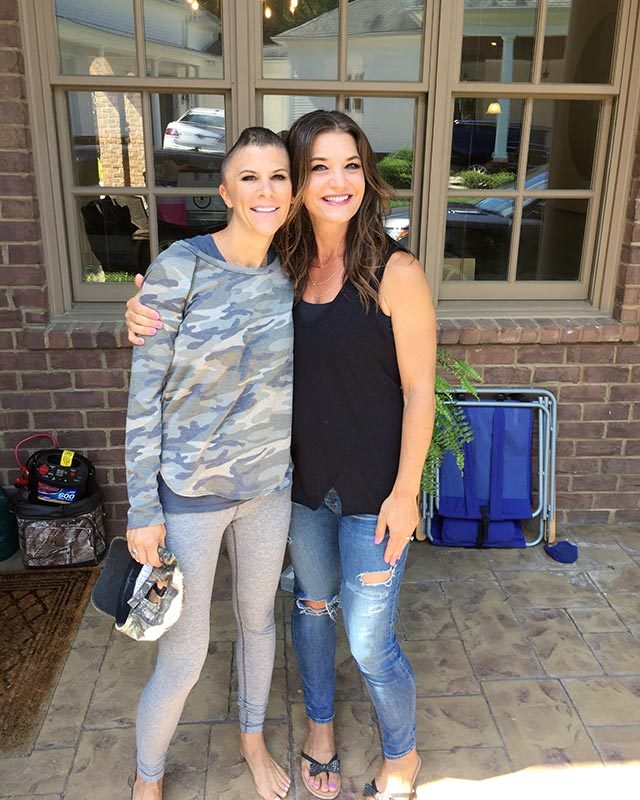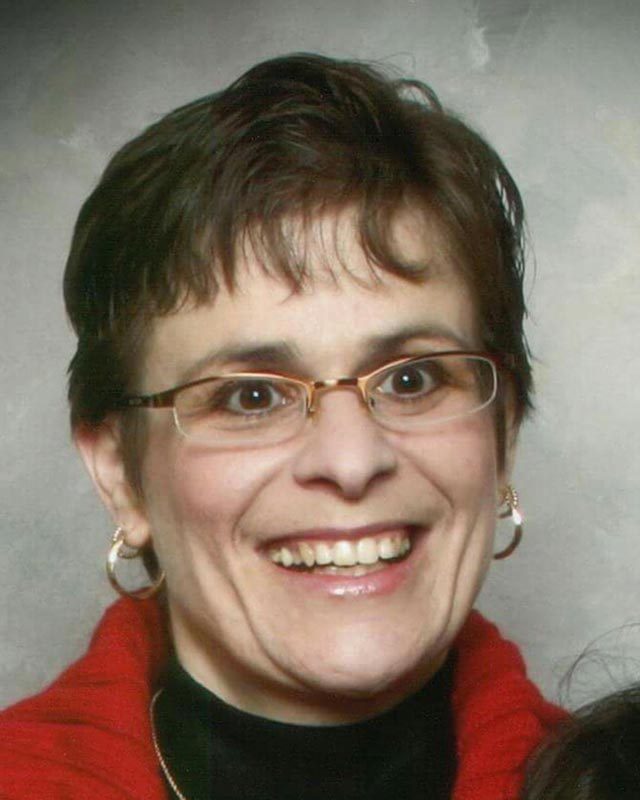
Zaida Khaze was hit by a drunk driver
Today, Zaida Khaze is a talkative, exuberant, fun-loving 43-year-old married mom of two girls, as well as an entrepreneur living in Fort Lee, New Jersey. (She’s the creator of the Wiggletot Diaper Changer, a changing-pad/detachable vest combo.) The scar on her chin is from 25 years ago, when a car she was riding in was hit by a drunk driver. That’s pretty much all she’ll be able to tell you about the accident—because immediately upon impact, she lapsed into a coma lasting 10 days and has no memory of anything that happened in that time.
At the neurological level, a coma is a prolonged state of unconsciousness, according to the Mayo Clinic. Clinically speaking, the brain is dormant—in a persistent sleep-like state—but awaiting a kick from an internal generator. Someone in a coma will be unresponsive to light, sound, and verbal communication, and is incapable of initiating purposeful action. Zaida’s coma measured an 8 out of 15 on the Glasgow Coma Scale, a method of assessing impairment of consciousness, and according to her medical records, this suggested a severe head injury. (In fact, CT scans revealed an acute subdural hematoma, which is bleeding between the surface of the brain and the membrane covering the brain).
Still foggy post-coma
Even after Zaida woke up from her coma, her memory was foggy. Beyond recalling dreams of her family surrounding her with love and support (in reality, they were never all present at the same time), she can’t remember much of what happened in the seven days that followed. It was only after she was transferred to a rehab hospital that she learned to speak, walk, and even swallow again. At the age of 19, Zaida now had the motor and verbal skills of a baby. Although it took her only a few weeks to relearn the basics of walking, talking, and eating, it was another five years before her voice didn’t sound raspy and breathy when she spoke.
And Zaida still suffered from short-term memory impairment and other cognitive deficiencies. “When I was given tests for my brain level, I remember feeling so down that I couldn’t remember the name of a pyramid based on a picture or many simple words,” she says. “I would describe it on such a macro level as being triangular, but I couldn’t remember simple stuff like the word for pyramid.” When she eventually returned to school, the process of learning felt foreign.
Exhaustion
Because trying to relearn how to learn was so exhausting, Zaida tired easily. In fact, she was tired all the time. “Before my accident, I always did things last minute, but now it wasn’t an option,” she says. “I would have to study every day and work on essays as soon as I got them instead of the night before they were due because of how tired I got from reading one page. It was a very scary time for me because I couldn’t estimate how long things would take me to do anymore. I lost so much control of myself with the traumatic brain injury.”
Around five years after the accident, Zaida grew tired in a different way: She was tired of all the therapy, which had begun to make her doubt herself and feel less than whole. Against the advice of her specialists—except for one cognitive therapist to whom she will be forever grateful—Zaida left her hometown in Canada for New York. But it wasn’t until nearly 15 years after the accident (around a decade ago) that Zaida began to feel like herself again.
That said, feeling like herself has meant adapting to a new normal. Certain losses have never been regained, and she suffers from a hormonal imbalance because of where her brain was damaged in the accident. But Zaida has moved beyond the losses, focusing instead on her strengths. She earned a business degree, got married to the man who was her boyfriend at the time of the accident, and went on to have children (despite being told she would never be able to have children because of her injuries).
“My belief in myself was greater than any medical diagnosis or specialist’s opinion,” Zaida says.
Check out these other inspiring stories that prove it’s never too late to change your life.

Adria Gross was bitten by an insect
Adria Goldman Gross, 63, is now the CEO and founder of MedWise Insurance Advocacy and MedWise Billing, Inc. (a company that negotiates medical bills and prevents overcharging). But one day when she was only a young woman, she was bitten by an insect carrying encephalitis, lapsed into a coma and was expected to be dead within the day.
Her coma lasted for 10 hours. She has no recollection of anything that happened during those 10 hours, which she describes as “being asleep without dreaming.” Her parents later told her that during the coma, they weren’t sure she would ever wake up again, and doctors thought she might have a deadly brain tumor.
Neither of those things was true (and these days, science may be on the cusp of a vaccine to prevent some diseases caused by certain viruses, some of which can be carried by mosquitoes). However, the consequences of that insect bite and the ensuing coma stretched out nearly 25 years.
Coming out of the coma
“I woke up spontaneously and in utter confusion,” Adria recalls. “My last memory was having been in a Hebrew school classroom. But suddenly I was lying in bed in a Catholic hospital, staring at a cross.” Even though she’s not Catholic, she believed that she was dead and had entered heaven. Adria woke up with all of her faculties intact, and her initial post-coma symptoms were limited to severe headaches. Accordingly, she didn’t have to relearn anything. But, she tells Reader’s Digest matter-of-factly, she did have to learn to live with the severe seizure disorder that resulted from the illness and the coma.
“My epilepsy was not controllable, even with 32 pills a day. The longest I went without a seizure was three months,” she says. “Living with a disability was devastating. It changed my relationships with many of my friends.” Finally, 25 years later, Adria had brain surgery that gave her relief from the seizures.
“Every time I think of waking up from the coma, I’m reminded of Dorothy waking up in The Wizard of Oz,” Adria says. Opening her eyes, she understood that her family and friends were all around her, but she had no recollection of what had happened to bring them there, or why she was lying in a hospital bed. Unfortunately, the next 25 years were brutal. That said, Adria feels blessed that epilepsy was her only long-term problem post-coma. And she feels even more blessed that she’s been seizure-free ever since her brain surgery.
Don’t miss these other mosquito-borne illnesses you should know about.

Economos Antony Gabriel got experimental medication
Seventy-seven-year-old retired clergyman Economos Antony Gabriel lapsed into a coma after undergoing surgery intended to prolong his life following a diagnosis of metastatic colon cancer. He also endured kidney failure and a host of other obstacles. But today, he is healthy and happy to shed light on those dark days, which he describes as a “dreamlike state in near silence.” (The silence inspired the title of his memoir, Silence: A Diary of Suffering and Redemption.)
The coma was the result of an experimental drug that Economos Antony was given in conjunction with his surgery. His first symptom was plummeting blood pressure, which was rapidly followed by his lapse into a coma. The coma lasted six weeks, during which doctors told his wife that his prognosis was dire. During the coma, he had to be resuscitated six times and had 10 more surgeries. After the last one, his wife was told that his chances were now slim to none and that only a miracle would save him. That was in 2004.
Brief moments of consciousness
Unlike Zaida and Adria, Economos Antony recalls moments of conscious awareness during his six-week coma. “At times, I could hear voices, but I couldn’t see,” he says. “It was really upsetting because I didn’t know exactly what was being said or who was talking. I didn’t even know what was going on.” And unlike Zaida and Adria, Economos Antony did not awaken spontaneously but was given medication to help bring him back.
“It was pure dread when I came out of the coma,” he recalls. “I was upset, and I didn’t understand what was happening. Everyone in the room was crying, and I was crying, too. Every orifice had a tube in it. I saw all these tubes, and I was so confused.” In addition, seeing himself for the first time after six weeks was shocking. “During that time, my appearance changed drastically. I was skin and bones and lost more hair during the coma than when I’d been undergoing chemotherapy.”
“At first, I was grouchy and upset,” he recalls, “and I had to relearn how to walk and talk. I had a respirator down my throat for an entire six weeks, and I had lost the ability to speak. It was hard. I virtually had to relearn how to be a functioning human being again. I also had to learn how to cope with the fact that I had been in a coma for six weeks, but also, that I was alive.”
The long-term effects have been nothing short of beautiful for Economos Antony, who now lives in Tuscon, AZ. He feels as if his suffering gave him the gift of a spiritual third eye that helps him see what really matters. “I experienced death and came back. It was a dramatic and impactful experience, and it gave me a new outlook on life,” he explains. “Life now has a whole new meaning, and I’m blessed to have gone through it and made it out alive. I don’t sweat the little things now, and I try to reach out to more people and tell them to live more fully. I encourage others to live more fully, and I do the same. I don’t get angry as fast, and I say ‘I love you’ more often. I reach out to more people, and I try to encourage them in any way I can.”
Here are the silent signs of colon cancer you might be missing—and the food that can significantly lower your risk of developing this disease.

Jennifer Beaver fell off a moving golf cart
Jennifer Beaver is the co-owner of BRANDed Management, a marketing and PR agency, and lives in the Nashville area. On the Saturday night before Father’s Day in 2017, she was sitting in the front seat of a golf cart with her husband, with two friends in the back seat. When she turned to talk to her friends, she slipped and fell off the moving golf cart. She saved the dog she washolding from falling but landed on her head, suffering a massive brain bleed.
“My husband laid in the street with my head on his arm and held me while my head was bleeding until first responders came,” Jennifer says. “I was not able to answer questions, and it was immediately apparent to everyone (except me) that my life was in immediate danger.” She was rushed to the nearest trauma hospital, whereupon she was whisked into emergency surgery. During that procedure, she says, “half of my skull was removed from my head.”
Jennifer’s medical team put her into a medically induced coma for a week to allow her brain to heal, but her prognosis was grim. A surgeon took Jennifer’s husband aside and told him that Jennifer was unlikely to survive and that if she did live, she might be severely disabled. Jennifer recalls hearing bits and pieces of discussions such as these. In fact, her hearing was more intact than any other of her senses during this time.
Hearing voices
“I remember voices of friends and family in the room, and one friend who flew in from L.A. to Nashville to see me,” she says. “Later on, I texted the friend and asked her if she had been in the room because I was certain I’d heard her voice, although I couldn’t recall seeing her.” The friend had, in fact, been there. “I remember I was never alone, and I remember hearing the presence of my family,” Jennifer adds. “I remember people trying to give me ice chips with a spoon, but I can’t remember seeing who it was.”
Jennifer’s neurosurgeon told her that this form of fragmented memory is typical. Jennifer also doesn’t recall waking up, but she believes that’s because she was brought out of her coma gradually. The first thing she does remember is hearing her mom’s voice and then begging for scissors to cut all the tubes that were hanging out of her body.
“I don’t recall much more than that,” she says with an air of sadness. “I am four months and one week past it, and I get frustrated because I’m not all better yet. I’m still waiting for another brain surgery and for the rest of my skull to be put back in my head. I have a lot of fluid in my head, and they will repair my skull until my brain is completely healed. It’s frustrating not being allowed to drive a car. I tried to go to a concert, but the noise was too loud for me. It’s not easy finding a new normal.”
Still, as one of her surgeons told her, she’s a walking miracle. “If there was a bell curve, I set it, they told me.”
Check out these other miraculous medical recoveries that still can’t be believed.

Jennifer Wise fell from a horse
Jennifer Wise was only 9 when the horse she was riding got stung by a bee and took off, running wildly. Unable to hold on, Wise slipped down the side of the horse, getting her foot caught in one of the stirrups before hitting her head on the ground. In one bounce, her hard hat was gone. There were still another eight or nine bounces, however, before the horse stopped. Jennifer’s mother was immediately beside her, telling her it wasn’t time for her to go. After that, Jennifer remembers nothing of the next two weeks, which she spent in a coma due to her severe skull fracture and brain swelling.
Her prognosis was highly uncertain, she’s been told, although she has no recollection of any of it, not even the moment she woke up. “It was a spontaneous waking,” she says. “One afternoon, I just woke up like I’d been napping.” But for Jennifer, it was terrifying. “I had no idea what had happened, where I was, why I was in so much pain, and why I couldn’t move.”
After waking up, Jennifer had to relearn everything, from sitting and eating to talking and walking, and that was just in the short term. In the long term, she had to have her right hip replaced because arthritis set in after her hip was dislocated due to the accident. But at the age of 49, Jennifer is grateful for her survival and for how fine she feels, both cognitively and physically. She’s alive and well, living in Toledo, Ohio, and is the proud mom of a 13-year-old boy.
Jennifer’s recovery was considered nothing short of miraculous by her medical team, but she believes it was the resilience of youth that made it possible.

T. Renee Garner had pregnancy complications
T. Renee Garner, A 46-year-old mom with a daughter and a son, lives in Gambrills, MD. She’s also a survivor of domestic violence, but that’s not what her coma story is about. T. Renee had already left the man who had been harming her when she had to be rushed the hospital, 32 weeks pregnant, with extremely high blood pressure and her fetus in distress.
T. Renee was given IV medication, and her baby boy was rapidly delivered, then rushed to the Neonatal Intensive Care Unit (NICU). But T. Renee’s treatment wasn’t working. She was visiting her son in the NICU when she began experiencing severe leg cramping so painful that it left her weeping.
The last thing she remembers before she slipped into a coma was seeing her father, who assured her she wasn’t dying. “Dying?” T. Renee thought, and then she felt more tired than she’d ever felt in her life. That’s when things went black. In the days that followed, it was determined that the coma was the result of a severe electrolyte imbalance caused by the medication for her pregnancy-induced high blood pressure. In fact, her sodium had dropped precipitously.
72 hours in a coma
The coma lasted three days, during which T. Renee remembers hearing a siren and then the words “it died,” which she took to mean that she had died. (It was actually a battery on a monitor that had died.) She also remembers having horrible dreams. “I can’t remember them, but I know they tormented me,” she says. “Every dream I had during my coma was a nightmare.”
She says that she woke up to the nurse telling her to rest. She also has a vague recollection of seeing her 12-year-old daughter’s face, which turned out to be her daughter attempting to FaceTime with her; the nurse was holding up the phone. But hearing and seeing were pretty much the extent of what T. Renee was capable of as she came out of her coma. “I couldn’t use any of my body,” she says. “I could see and hear and think, but I couldn’t talk or walk or eat. Or anything else. I cried when I could not use my limbs, or tried to speak and could not say a word without stammering.”
Would the coma damage be permanent?
She cried because she believed that the deficits in her motor skills were permanent. Thankfully, that wasn’t the case, and for that, T. Renee is beyond grateful. Nor does she have regrets about the time she lost to her coma. “Although it was scary, the rest or deep sleep was necessary in order for my body to heal itself,” she explains. “And I feel thankful I was still in the hospital when I lost consciousness because that’s the only reason I’m still alive.” T. Renee has used her gratitude as motivation to write and produce a gospel musical-comedy play called The Man Monster, created, in part, to inspire women to take charge of their lives and make a new start, for whatever reason. “Have a purpose,” she wants to tell the world. “Go out and live your dreams.”
Not all comas are actually comas. You won’t want to miss the terrifying story of a woman who was told her husband was in an irreversible coma, when, in fact, he was suffering from “locked-in syndrome.”

